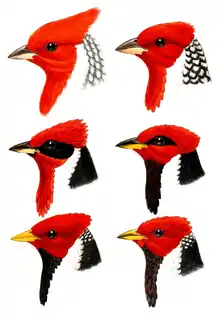| Paroaria | |
|---|---|
 | |
| Top left: Paroaria coronata Top right: Paroaria dominicana | |
 | |
| Paroaria coronata in Buenos Aires, Argentina | |
| Scientific classification | |
| Domain: | Eukaryota |
| Kingdom: | Animalia |
| Phylum: | Chordata |
| Class: | Aves |
| Order: | Passeriformes |
| Family: | Thraupidae |
| Genus: | Paroaria Bonaparte, 1832 |
| Type species | |
| Fringilla cucullata[1] =Loxia coronata Vieillot | |
| Species | |
|
See text | |

Paroaria, the red-headed cardinals or cardinal-tanagers (as they are not close to the Cardinalidae), are a genus of tanagers. They were until recently placed in the family Emberizidae.
Five or six species are placed here. They are all very similar-looking birds, with heads resembling that of a northern cardinal (Cardinalis cardinalis, a true member of the Cardinalidae), though they are somewhat more slender, in particular the rather tanager-like bill.
Their coloration is also typical; they are quite unlike any Cardinalidae, though they bear a passing resemblance to adult male rose-breasted grosbeak (Pheucticus ludovicianus). Like these, they are white below and dark above (grey to blackish in the case of Paroaria). But unlike P. ludovicianus, they have no conspicuous pattern except for the head, which has large amounts of bright red; it may be predominantly so or patterned red-and-black. Almost all Paroaria have at least a short crest. The bill is yellowish below or in its entirety.
Taxonomy and species list
The genus Paroaria was introduced in 1832 by the French naturalist Charles Lucien Bonaparte with the red-crested cardinal as the type species.[2][3] The name is from Tiéguacú paroára, a name for a small yellow, red and grey bird in the extinct Tupi language.[4]
The genus contains six species:[5]
| Image | Scientific name | Common Name | Distribution |
|---|---|---|---|
 | Paroaria coronata | Red-crested cardinal | Northern Argentina, Bolivia, Paraguay, Uruguay, Brazil's Rio Grande do Sul and southern part of the Pantanal. Introduced to the Hawaiian Islands. |
 | Paroaria dominicana | Red-cowled cardinal | Brazil. |
 | Paroaria gularis | Red-capped cardinal | Guianas, Venezuela, eastern Colombia, eastern Ecuador, eastern Peru, northern and eastern Bolivia and the Amazon basin in Brazil. |
 | Paroaria nigrogenis | Masked cardinal | Trinidad, far north-eastern Colombia and northern Venezuela |
| Paroaria baeri | Crimson-fronted cardinal | Brazil. | |
.JPG.webp) | Paroaria capitata | Yellow-billed cardinal | Brazil, Paraguay, Bolivia, Uruguay, and northern Argentina. Introduced to the Hawaiian islands. |
References
- ↑ "Thraupidae". aviansystematics.org. The Trust for Avian Systematics. Retrieved 2023-07-16.
- ↑ Bonaparte, Charles Lucien (1832). "Aggiunte e correzioni relative agli animali vertebrati a sangue caldo". Giornale Arcadico di Scienze, Lettre ed Arti (in Italian). 52: 190–209 [206].
- ↑ Paynter, Raymond A. Jr, ed. (1970). Check-List of Birds of the World. Vol. 13. Cambridge, Massachusetts: Museum of Comparative Zoology. p. 212.
- ↑ Jobling, James A. (2010). The Helm Dictionary of Scientific Bird Names. London: Christopher Helm. p. 293. ISBN 978-1-4081-2501-4.
- ↑ Gill, Frank; Donsker, David; Rasmussen, Pamela, eds. (July 2020). "Tanagers and allies". IOC World Bird List Version 10.2. International Ornithologists' Union. Retrieved 1 November 2020.
![]() Media related to Paroaria at Wikimedia Commons
Media related to Paroaria at Wikimedia Commons